Photo by Iñaki del Olmo on Unsplash

Armstrong, Karen. The Great Transformation: The Beginning of Our Religious Traditions (Anchor; Reprint edition, 2007).
This is a discussion of the Axial Age that focuses on the emergence of the great themes of compassion and nonviolence. An extraordinary investigation of a critical moment in the evolution of religious thought. In the ninth century BCE, events in four regions of the civilized world led to the rise of religious traditions that have endured to the present day--the development of Confucianism and Daoism in China, Hinduism and Buddhism in India, monotheism in Israel, and philosophical rationalism in Greece. Karen Armstrong, one of our most prominent religious scholars, examines how these traditions began in response to the violence of their time. Studying figures as diverse as the Buddha and Socrates, Confucius and Jeremiah, Armstrong reveals how these still enduring philosophies can help address our contemporary problems.

Armstrong, Karen. A Short History of Myth (Cannongate, U.S., 2006).
“Human beings have always been mythmakers.” So begins best-selling writer Karen Armstrong’s concise yet compelling investigation into myth: what it is, how it has evolved, and why we still so desperately need it. She takes us from the Paleolithic period and the myths of the hunters right up to the “Great Western Transformation” of the last five hundred years and the discrediting of myth by science. The history of myth is the history of humanity, our stories and beliefs, our curiosity and attempts to understand the world, which link us to our ancestors and each other. Heralding a major series of retellings of international myths by authors from around the world, Armstrong’s characteristically insightful and eloquent book serves as a brilliant and thought-provoking introduction to myth in the broadest sense—and explains why if we dismiss it, we do so at our peril.

Bellah, Robert and Hans Joas, editors. The Axial Age and Its Consequences (Belknap Press, 2012).
The first classics in human history—the early works of literature, philosophy, and theology to which we have returned throughout the ages—appeared in the middle centuries of the first millennium bce. The canonical texts of the Hebrew scriptures, the philosophical writings of Plato and Aristotle, the Analects of Confucius and the Daodejing, the Bhagavad Gita and the teachings of the Buddha—all of these works came down to us from the compressed period of history that Karl Jaspers memorably named the Axial Age.
In The Axial Age and Its Consequences, Robert Bellah and Hans Joas make the bold claim that intellectual sophistication itself was born worldwide during this critical time. Across Eurasia, a new self-reflective attitude toward human existence emerged, and with it an awakening to the concept of transcendence. From Axial Age thinkers we inherited a sense of the world as a place not just to experience but to investigate, envision, and alter through human thought and action.
Bellah and Joas have assembled diverse scholars to guide us through this astonishing efflorescence of religious and philosophical creativity. As they explore the varieties of theorizing that arose during the period, they consider how these in turn led to utopian visions that brought with them the possibility of both societal reform and repression. The roots of our continuing discourse on religion, secularization, inequality, education, and the environment all lie in Axial Age developments. Understanding this transitional era, the authors contend, is not just an academic project but a humanistic endeavor.
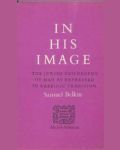
Belkin, Samuel. In His Image: The Jewish Philosophy of Man as Expressed in Rabbinic Tradition (Abelard-Schuman, 1960.
In His Image, Dr. Belkin explains that Judaism is fundamentally a Democratic Theocracy. A theocracy because Jewish thought has always accepted as its first principle the Kingship of God. And a Democracy since the written and the oral law place great emphasis on the infinite worth of each human being.

Benedikt, Michael. God is the Good We Do: Theology of Theopraxy (Bottino Books, 2007).
God Is the Good We Do invites believers and agnostics to return to their spiritual heritages with a changed understanding of how religions are and are not carrying out God's will. At the same time, it invites atheists to see that God is not the oldest and strongest but the youngest and weakest force in the universe, a force whose existence depends on them as much as anyone else. God Is the Good We Do appeals to both mind and heart, offering a fresh way to think about God in this scientific and media-saturated age.
 Buckman, Robert. Can We Be Good Without God? (Prometheus Books, 2002)
Buckman, Robert. Can We Be Good Without God? (Prometheus Books, 2002)
Recent neurological studies have shown that there are regions of the brain that seem predisposed to create beliefs. Are we hardwired to believe? And if so, why do beliefs sometimes inspire major contributions to society, while on other occasions they precipitate horrendous acts of destruction?
In this provocative and stimulating study of the connection between belief and behavior, Dr. Robert Buckman begins by reviewing the history of religious belief, showing the many shared themes among religions of diverse cultures. He then explains little-publicized data from neuroscience on the limbic system and the right-hand temporal lobe of the brain, which when stimulated consistently produces deep-seated spiritual feelings. Recent experiments reveal that this portion of the brain may underlie the development of many common religious beliefs, and perhaps the more aggressive and destructive behaviors associated with some of them. Buckman also summarizes evidence regarding pheromones and their effect on the limbic system, as a possible mechanism for certain types of crowd behavior, whether in a religious or secular context.
Finally, considering the long historical relationship between religion and ethics, Buckman asks whether we can develop better, non-theistic belief systems that avoid the destructive aspects of traditional religious beliefs. He then describes ways in which we can become aware of, and perhaps, correct our "limbic urges" when they threaten to lead to destructive behavior. This ambitious work, synthesizing research from many disciplines, provides much insight into the mechanisms of belief and religious fanaticism.

Campbell, Joseph with Bill Moyers. The Power of Myth (Anchor, 1991).
Among his many gifts, Joseph Campbell's most impressive was the unique ability to take a contemporary situation, such as the murder and funeral of President John F. Kennedy, and help us understand its impact in the context of ancient mythology. Herein lies the power of The Power of Myth, showing how humans are apt to create and live out the themes of mythology. Based on a six-part PBS television series hosted by Bill Moyers, this classic is especially compelling because of its engaging question-and answer format, creating an easy, conversational approach to complicated and esoteric topics. For example, when discussing the mythology of heroes, Campbell and Moyers smoothly segue from the Sumerian sky goddess Inanna to Star Wars' mercenary-turned-hero, Han Solo. Most impressive is Campbell's encyclopedic knowledge of myths, demonstrated in his ability to recall the details and archetypes of almost any story, from any point and history, and translate it into a lesson for spiritual living in the here and now. (Gail Hudson for Amazon.com)
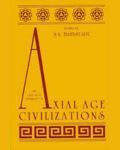
Eisenstadt, S. N., ed. The Origins and Diversity of Axial Age Civilizations (State University of New York, 1986).
This book presents a new and original analysis of the great ancient civilizations, focusing on the breakthroughs and their institutionalization in Greece, Israel, China, and India. The conditions under which these civilizations developed are systematically explored. For comparative purposes, the civilization of Assyria, where such a breakthrough did not take place is analyzed.
The entire book is available in PDF form at Project Muse
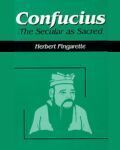
Fingarette, Herbert. Confucius: The Secular as Sacred (Waveland Press, 1998).
An ideal way to discover the teachings of Confucius! Fingarette's primary aim is to help readers discover what is distinctive in Confucius and to learn what he can teach us. Fingarette-who thinks the best way to discover Confucius's teaching is by taking him at his word-uses original text as his principal resource in an effort to try to see what it says, what it implies and what it does not say or need not imply.

Girard, Rene. Violence and the Sacred (Bloomsbury Academic, 2005).
His fascinating and ambitious book provides a fully developed theory of violence as the 'heart and secret soul' of the sacred. Girard's fertile, combative mind links myth to prophetic writing, primitive religions to classical tragedy.
~ Victor Brombert, Chronicle of Higher Education

Holloway, Richard. Godless Morality: Keeping Religion Out of Ethics (Canongate U.S., 2002).
Richard Holloway's highly acclaimed analysis of contemporary morality has met with great success in the U.K., while causing a great deal of controversy with its broadminded and refreshingly unhypocritical and honest views on life in modern society. Godless Morality tackles issues that affect us all -- it is a book with which every member of our society should engage.
Holloway's language and style are engaging, his research conscientious and his conclusions thoughtful and frequently wise.
~ The Sunday Times (London)
A passionate, provocative and commonsense challenge to easy cant.
~ The Observer (London)

Jaspers, Karl. The Great Philosophers: The Foundations (Harcourt, Brace and World, 1962).
Karl Jasper identified a number of key Axial Age thinkers as having had a profound influence on future philosophies and religions, and identified characteristics common to each area from which those thinkers emerged. Jaspers saw in these developments in religion and philosophy a striking parallel without any obvious direct transmission of ideas from one region to the other, having found no recorded proof of any extensive intercommunication between Ancient Greece, the Middle East, India, and China. Jaspers held up this age as unique, and one to which the rest of the history of human thought might be compared. Jaspers' approach to the culture of the middle of the first millennium BC has been adopted by other scholars and academics, and has become a point of discussion in the history of religion.

Jaspers, Karl. The Origin and Goal of History (Routledge, 2011).
First published in English in 1953, this important book from eminent philosopher Karl Jaspers deals with the phdilosophy of the history of mankind. More specifically, its avowed aim is to assist in heightening our awareness of the present by placing it within the framework of the long obscurity of prehistory and the boundless realm of possibilities which lie within the undecided future.This analysis is split into three parts: world history, the present and the future, and the meaning of history.

Nasr, Seyyed Hossein. The Garden of Truth: The Vision and Promise of Sufism, Islam’s Mystical Tradition (HarperOne, 2008).
The headlines are filled with the politics of Islam, but there is another side to the world's fastest-growing religion. Sufism is the poetry and mysticism of Islam. This mystical movement from the early ninth century rejects worship motivated by the desire for heavenly reward or the fear of punishment, insisting rather on the love of God as the only valid form of adoration. Sufism has made significant contributions to Islamic civilization in music and philosophy, dance and literature. The Sufi poet Rumi is the bestselling poet in America. But in recent centuries Sufism has been a target for some extremist Islamic movements as well as many modernists. The Garden of Truth presents the beliefs and vision of the mystical heart of Islam, along with a history of Sufi saints and schools of thought.
In a world threatened by religious wars, depleting natural resources, a crumbling ecosystem, and alienation and isolation, what has happened to our humanity? Who are we and what are we doing here? The Sufi path offers a journey toward truth, to a knowledge that transcends our mundane concerns, selfish desires, and fears. In Sufism we find a wisdom that brings peace and a relationship with God that nurtures the best in us and in others.
Noted scholar Seyyed Hossein Nasr helps you learn the secret wisdom tradition of Islam and enter what the ancient mystics call the "garden of truth." Here, liberate your mind, experience peace, discover your purpose, fall in love with the Divine, and find your true, best self.

Outka, Gene. Agape: An Ethical Analysis (Yale University Press, 1977).
This study is the most comprehensive account to date of modern treatments of the love commandment. Gene Outka examines the literature on agape from Nygren's Agape and Eros in 1930. Both Roman Catholic and Protestant writings are considered, including those of D'Arcy, Niebuhr, Ramsey, Tillich, and above all, Karl Barth. The first seven chapters focus on the principal treatments in the theological literature as they relate to major topics in ethical theory. The last chapter explores further the basic normative content of agape and discusses some of the most characteristic problems.
The book is in my judgment the best recent work in religious ethics. Outka brings together analytic moral philosophy and theological ethics, providing a masterly survey of views and issues arising in the past forty years. . . . I can think of few books of interest to scholars in both philosophy and theology, but Outka's is one. Unlike some scholars who are at home in continental theology, Outka is also at home in secular analytic philosophy; he brings them together in a mutually illuminating way.
~ Donald Evans
Outka has mastered this vast literature on love, and has brought a critical and clarifying analysis to bear upon it. This is a most important book on a most important subject, and brings the whole discussion into a new phase.
~ John Macquarrie
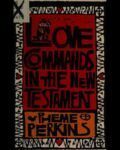
Perkins, Pheme. Love Commands in the New Testament (Paulist Press International, 1982).
In this present volume, Dr. Perkins in her always lucid yet comprehensive and profound scholarly manner explains the central teaching of Jesus Christ, to love one another, and explores several aspects of that historical and theological phenomenon.
She sets the historical and sociological context in which such commands emerge, and she discovers such a commandment and commissioning not so unusual in the time and place of Jesus, as it draws not only form the Old Testament, including the decalogue, but also from the hellenistic code of ethics widespread across the eastern Mediterranean, including the region of the childhood home of Jesus in northern Israel. We today now find it most odd and unheard of that Jesus commands us to love one another, including loving our own enemies and doing good to those who harm and insult us. It strikes us as oddly as reading the Bill of Rights as a central document of our government. But indeed the central commandment of our faith is to Love one another, including our own enemies.
Dr. Perkins in fact dedicates a chapter in this learned book to Love of Enemy. She also discusses at length the love experienced by the prodigal son and shown by the good samaritan, who did not allow his status as "enemy" to hold him from loving a stranger at great expense and risk to his own life.
She discusses well the metaphors for love used in the New Testament, and devotes several chapters to every aspect of this love, all while clinging closely to the scriptural sources and avoiding any kind of specific "relevance" to the political and social phenomena of twenty five years ago, when this excellent text was written as a series of sermons to Mennonites, the masters of dedicated peaceful service in Gospel love. (C.Scanlon)

Ramadan, Tariq. The Quest for Meaning: Developing a Philosophy of Pluralism (Penguin Global, 2011).
In The Quest for Meaning: Developing a Philosophy of Pluralism, Tariq Ramadan embarks on a journey to uncover the profound truths that bind us together. In a world so full of different beliefs and viewpoints, how can we find peace in our shared humanity? Acclaimed thinker and philosopher Tariq Ramadan explores universal ideas such as love, respect, truth and tolerance, and examines questions such as how can men and women relate to each other? What is the true nature of equality? What does 'civilization' really mean? In doing so, he opens our minds to a new view of humanity. Whether we are Christian or Buddhist, Jewish or Muslim, secularist or believer, he reveals that all traditions of thought spring from the same place, and guides us to see past what divides us and discover the beauty of what we have in common. This book has resonance for all of us, showing why, eventually, all different spiritual paths lead to the human heart. "A prophetic, passionate and insightful book". (Karen Armstrong, Financial Times).
Tariq Ramadan is Professor of Contemporary Islamic Studies at the Faculty of Oriental Studies and St Antony's College (University of Oxford). He is the Director of the Centre for Islamic Legislation and Ethics (Doha). He is the author of The Quest for Meaning and The Messenger, and has been described as one of the 'most important innovators for the twenty-first century' by Time magazine.
 Schottroff, Luise. Essays on the Love Commandment (Augsburg Fortress Publishing, 1978).
Schottroff, Luise. Essays on the Love Commandment (Augsburg Fortress Publishing, 1978).
Series of essays originally written in German and published in English, published in 1975 under the title: Jesus Christus in Historie und Theologie. Individual essays on non-violence and the love of one's enemies, the double commandement of love and reflections of the Sermon on the Mount.

Soltes, Ori Z. and Margaret A. Johnson (Editors). Preventing Violence and Achieving World Peace: The Contributions of the Guelen Movement (Peter Lang Publishers, 2012).
At a time of utter urgency in Muslim/non-Muslim relations, this book on the Guelen Movement appears as a beacon of hope, offering multifaceted insight into Guelen's thought and practice - touching upon themes of philosophy, education, interfaith mysticism, universalism, and the cosmos. It offers significant support to the Charter for Compassion movement, another grassroots effort, also grounded in the need for self-improvement, humility, education toward tolerance and away from violence, and, above all, in the compatible notion of hizmet - outward action of kindness and service toward the other. Taking these insights to heart may help to awaken humanity to embrace 'our diversity as a species. and - insha'Allah - to achieve 'fullness of peace' in our time. (Helen McConnell, CAN [Compassionate Action Network] International Fellow; Co-Founder of the Compassionate Washington, D.C. Campaign)

Sviri, Sara. The Taste of Hidden Things (The Golden Sufi Center, 1997).
The Taste of Hidden Things is a portrait of Sufism as a living mystical system. Sara Sviri brings together the wisdom, metaphysical boldness, and lyrical passion of the great Sufi masters, past and present. A special place is given to al-Hakîm of Tirmidhî. Excerpts from his work, including teaching dreams of his wife, are published here for the first time in English.
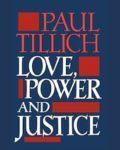
Tillich, Paul. Love, Power and Justice (Oxford University Press, USA, 1960).
This book presents Paul Tillich at his very best--brief, clear, stimulating, provocative. Speaking with understanding and force, he makes a basic analysis of love, power, and justice, all concepts fundamental in the mutual relations of people, of social groups, and of humankind to God. His concern is to penetrate to the essential, or ontological foundation of the meaning of each of these words and thus save them from the vague talk, idealism, cynicism, and sentimentality with which they are usually treated. The basic unity of love, power, and justice is affirmed and described in terms that are fresh and compelling.

Tu Wei-Ming. Confucian Thought: Selfhood as Creative Transformation (State University of New York, 1985).
Tu Wei-ming is the foremost exponent of Confucian thought in the United States today. Over the last two decades he has been developing a creative scholarly interpretation of Confucian humanism as a living tradition. The result is a work of interpretive brilliance that revitalizes Confucian thought, making it a legitimate concern of contemporary philosophical reflection. This book is a collection of Tu's seminal essays. It is a sustained deliberation of the substance and worth of the Confucian conception of personhood. This analysis complements Tu's highly acclaimed Humanity and Self-Civilization: Essays in Confucian Thought as a continued expression of his deepening understanding of Confucianism voiced through various perennial human concerns. Tu weaves philosophic, historical, anthropological, sociological, and psychological perspectives into a coherent discussion of the Confucian themes that continue to inspire the modern intellectual mind. His is a vital contribution to Chinese thought and religion. Tu Wei-ming is a professor of Chinese History and philosophy at Harvard University.

Vorspan, Albert and David Saperstein. Jewish Dimensions of Social Justice: Tough Moral Choices of Our Time (Urh Press, 1998).
This fully updated successor to Tough Choices and to the widely used series of social justice texts by Albert Vorspan and David Saperstein is the perfect volume for confirmation, high school, youth groups, and adult education classes. Bringing together Jewish perspectives and moral policy analysis on scores of urgent issues- from abortion to capital punishment and from the Mideast peace process to religious freedom in Israel and the United States--Jewish Dimensions of Social Justice looks closely at the challenges posed by these and other areas of social justice to Jews in North America today. Utilizing the popular "Real Dilemmas" rubric, Jewish Dimensions of Social Justice introduces readers and students to those social dilemmas that have faced our nation and community over the past two tumultuous generations by drawing them into the debate over issues Jews have confronted in the past and continue to face today.

